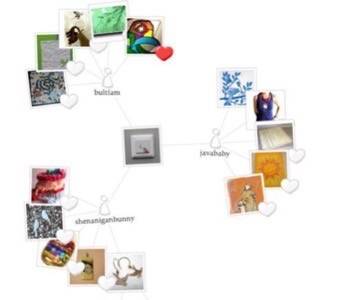For a long time, artisans wishing to sell their hand crafted goods generally had to do so locally through gift shops, swap meets, and craft fairs. Then in the mid-90s along came eBay, and for many years it was the best option for artisans to get their goods out to the world. But in the past couple of years, new online marketplace startups targeted specifically at the needs of independent artists and crafts people have emerged.

Below we’ll take a brief look at three such startups as well as eBay.

For between $15.95 and $499.95 per month, eBay offers sellers a complete store front option (this is in addition to normal per transaction fees). Depending on the level of service purchased, sellers can customize their store front and have access to a handful of promotional, branding and management tools. The biggest attraction to eBay stores, however, is the access they give artisans to the enormous eBay audience.
On the buyers’ end of the spectrum, eBay can be pretty daunting. With literally millions of items for sale every day it can be hard to find what you’re looking for using just their simple keyword search tool. Luckily, eBay has a rather extensive category tree, and a near search tool that automatically performs your search with different combinations of your keyword entries. For example, my search for “thick blue cotton yarn” didn’t get me any results, but by automatically dropping the word “thick,” eBay located 60 items.
TigerStars is a typical eBay store front.

Etsy, which was founded in Brooklyn, NY in 2005, is a site that styles itself as a “place to buy and sell all things handmade.” It is free for sellers to open a storefront on Etsy, which doesn’t offer much in the way of customization beyond a logo header, and is very competitive on fees. Etsy lets sellers tag their items with description tags as well as tags relating to materials, and buyers can narrow product searches using that information. Store owners can define their own categories within their store.
The buyer side is where Etsy really shines. Users can search by keyword, tag, or materials, or search for specific sellers. Etsy also offers a nifty flash-based color search, and the Treasury, which is kind of like Amazon’s lists function and lets people create collections of products. There is also the Geolocator, letting you shop by locale, the Showcase, which are daily paid feature spots for store owners, and the Time Machine, which lists the most recent items listed on Etsy. The site also has a traditional browse-by-category function, though it is not nearly as exhaustive as eBay’s.
Etsy’s Connections is an innovative way to browse.

Two of the most innovative offerings for buyer at Etsy are the Connections search and Alchemy. Alchemy was a way for buyers to request custom goods, but it is currently being revamped and not online at the moment. Connections is an interesting flash visualization that lets you browse from user to user by exploring their list of favorites.
Eirene is a typical Etsy store front.

DaWanda is a startup from Germany that is something like the Etsy of Europe, though there are a handful of sellers outside of Europe using the site. Setting up a store on DaWanda is free for sellers, and they also don’t currently charge a per listing fee, unlike most other sites in this category — though they say that will eventually change. For the time being, the only fee they charge is a 5% take on sold items. Anything can be sold on DaWanda, provided that it is “is unique, customizable and/or handmade.”
Buyers can browse DaWanda by categories, tags, colors, materials, and technique. That last one is unique to the site and lets users shop for items that were sewn or embroidered, for example. DaWanda has a favorites feature they call your “pinboard,” which lets users save items for later viewing. Adding a user to your pinboard makes that user your friend. Users can send messages to each other, and comment on items or member profiles.
Chocolate and Steel is a typical DaWanda store front.

Lov.li is “a community of people who love art, crafts and handmade products,” and probably focuses on the social networking aspects more than the other sites in this round up. Like DaWanda, Lov.li does not charge listing fees, however the reason is that they encourage people to post items that are not for sale simply to share. Lov.li does take a modest 3.5% commission on sold items. The site doesn’t offer a store front, per se, but users are given a profile that lists all of their items, and it can be linked to other sites like eBay, Etsy, and Flickr.
Because Lov.li is a social network site first and an ecommerce site second, the search tools for buyers aren’t great. There is only a simple keyword search and browse by tag feature. What Lov.li offers that the other sites in this article don’t, is a full fledged social network, including profiles, friends, blogs, events, and groups.
Polyartgirl is a typical Lov.li user page.

















